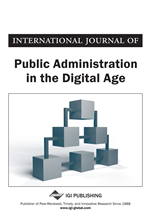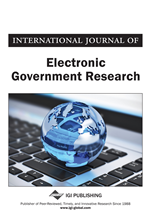Search
Results: 29
Environmental Disclosure as a Tool for Public Sector Legitimacy
The purpose of this study is to measure the extent of Twitter environmental reporting by Andalusian municipalities (Spain) and identify the determinant factors of such a disclosure. Thus, factors such as population, geolocation...
Published by: IGI Global
Exploring the Gender Digital Divide in E-Government Use in a Developing Country
Ali Acilar
Oct 01, 2020
This article explores the gender digital divide in e-government use in Turkey. Historical trends and differences in internet and e-government use by males and females are investigated. The findings of this study indicate that...
Published by: IGI Global
Investigating Change Management Based on Participation and Acceptance of IT in the Public Sector
The digitalization of public administrations faces big challenges regarding employees' acceptance of IT. Change management approaches based on participation should help achieving acceptance and success of IT projects in the...
Published by: IGI Global
Building a Certification and Inspection Data Infrastructure to Promote Transparent Markets
Joanne Luciano, Djoko Sayogo, Weijia Ran, Nic DePaula, Holly Jarman, Giri Tayi, Jing Zhang, Jana Hrdinova, Theresa Pardo, Deborah Andersen, David Andersen, Luis Luna-Reyes
Oct 01, 2017
This article reports on data architecture that reduces information asymmetries to support public-private collaboration to govern product certification and inspection for promoting transparent markets and building consumer trust....
Published by: IGI Global
A Participative Method for Prioritizing Smart City Interventions in Medium-Sized Municipalities
One of the most critical issues relating to smart cities is the selection of the most suited interventions, among numerous available options. Especially when medium-sized municipalities are concerned that typically have less...
Published by: IGI Global
E-Government Awareness and Adoption by the Residents
This paper presents the results of an empirical survey study conducted on people living in North Cyprus, aiming to measure awareness of e-government practices. Brief information regarding e-government, awareness and adoption...
Published by: IGI Global
Service, Openness and Engagement as Digitally-Based Enablers of Public Value?
Jeffrey Roy
Jul 01, 2019
Public value creation is increasingly viewed as a central pivot of a government's digital transformation. The objective of this article is twofold: to better understand some of the major inhibitors of public value creation...
Published by: IGI Global
Exploring the Role of Participation in Government Employees' Adoption of IT
Mariem Ben Rehouma
Jan 01, 2020
Employee participation in IT projects is considered to be a critical IT adoption factor in the public sector. However, research into the impact of participation on government employee adoption of IT is very limited. Therefore...
Published by: IGI Global
Citizen Attitudes Towards E-Government Services
This article presents the findings of a comparative study about citizen attitudes towards e-government services, which was conducted in the Northern and Southern Nicosia Municipalities in Cyprus. The study is important and...
Published by: IGI Global
Structural Coupling of Regulatory Elements and Reality Challenges
Mirko Pečarič
Apr 01, 2020
Different realities are possible and thus also different decisions. They are based on predispositions faced with different challenges that people (do not) acknowledge. The research objective is to point at differences when the...
Published by: IGI Global
E-Government Adoption in Tunisia Extending Technology Acceptance Model
Wadie Nasri
Oct 01, 2019
The purpose of this study is to examine the factors which affect e-government services adoption of Tunisian's citizens by using a technology acceptance model (TAM). The proposed conceptual model was extended by adding social...
Published by: IGI Global
“Zeropay”
June-Suh Cho
Jul 01, 2020
ZeroPay is a “zero-fee payment service,” which is designed to help small businesses. It is a QR code-based mobile secure payment service that the government, Seoul Metropolitan Government (SMG), bank, and private settlement...
Published by: IGI Global
Agency vs. Stewardship Theory in Local Government Contracted Mobile Apps
This paper examines citizen satisfaction levels with local government contracted mobile platforms and applies two theories of the contracting relationship to them: principal-agent and stewardship theory. It uses survey data to...
Published by: IGI Global
Citizens in the Smart City
Zsuzsanna Tomor
Jan 01, 2020
While the role of citizens in smart cities is hotly debated, there is a dearth of empirical research on the subject. This in-depth study of a European city, selected for its typical smart city ambitions, explores the roles that...
Published by: IGI Global
Will Facebook Encourage Citizen Participation?
Facebook, the most popular social media in the world, has changed the ways of citizen involvement in governance. Politicians and (elected) public administrators worldwide have adopted Facebook as an important approach to connect...
Published by: IGI Global
An Exploratory Study on Co-Locating Voter Registration in Telecentres Case of Malawi
Frank Makoza
Apr 01, 2019
This article explores how co-locating voter registration at telecentres can address some of the challenges in the electoral process of a developing country. A case in Malawi was analysed using secondary data. A general inductive...
Published by: IGI Global
Public Policy Issues in Direct and Digital Marketing – Concerns and Initiatives
Pratap Mandal
Oct 01, 2019
Companies require information about customers to understand them, know their preferences, and develop relationships with them. Companies employ a number of direct and digital marketing channels to collect information and...
Published by: IGI Global
Exploring Local Governance and E-Services in Qatar
Properly implemented, e-government enables improved government efficiency and greater engagement with citizens. The State of Qatar has implemented many e-government initiatives but little has been done to investigate their...
Published by: IGI Global
MCDM for Candidate Selection in E-Voting
E-voting is one of the most important components of e-democracy and forms the basis of a democratic governance system. Voting results always lead to a broad debate in terms of candidate selection and whether the candidate...
Published by: IGI Global
Using Hotspot Information to Evaluate Citizen Satisfaction in E-Government
Gunay Iskandarli
Jan 01, 2020
The identification of issues that the public cares about in e-government can help government agencies improve the quality of services and increase citizen satisfaction. In this environment, citizen satisfaction can be provided...
Published by: IGI Global
“Wait and See”
Tariq Zaman
Oct 01, 2020
As personal and collective community development becomes increasingly inseparable from interactions with information and communication technologies (ICTs), new constructs representing this relationship need to be explored. In...
Published by: IGI Global
Evaluating the Presence of Greek Tourism-Related Public Sector Entities in Online Social Networks
Social networks have become one of the most popular tools in promoting the tourism product. This applies to National Tourism Agencies, as well as tourism-related general government bodies (GGBs) and local authorities (LAs). This...
Published by: IGI Global
New Governance and Digital Platform Companies
Ebru Bilbil
Apr 01, 2019
Based on a new governance theory as regulatory governance, this article analyzes how a new economy creates new transaction costs at the local level due to the lack of legal coordination based on diversity and competition. The...
Published by: IGI Global
Analysing Open Data in Virtual Research Environments
Anneke Zuiderwijk
Oct 01, 2017
This article describes how virtual research environments (VREs) offer new opportunities for researchers to analyse open data and to obtain new insights for policy making. Although various VRE-related initiatives are under...
Published by: IGI Global
Determinants of Financial E-Transparency in Honduran Municipalities
This paper contributes to the scarce literature on e-government transparency in Central America by analyzing the impact of political, financial and socio-economic factors on municipal financial e-transparency in Honduras. The...
Published by: IGI Global
|
|< |
< |
1 |

